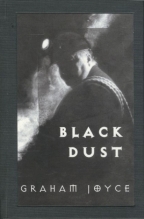Black Dust
Graham Joyce
Subterranean Press
US Hardcover Chapbook
ISBN 1-892284-92-8
Publication Date: 06-15-2002
47 Pages; $40.00
Date Reviewed: 06-27-02
Reviewed by Rick Kleffel © 2002

REFERENCES
COLUMNS
|
|
|
Black DustGraham JoyceSubterranean PressUS Hardcover ChapbookISBN 1-892284-92-8Publication Date: 06-15-200247 Pages; $40.00Date Reviewed: 06-27-02Reviewed by Rick Kleffel © 2002 |
|
|
REFERENCES |
COLUMNS |
A little simplicity goes a long way in the short story format. 'Back Dust' is Graham Joyce's chapbook for Subterranean Press, with two short stories that showcase his clear, simple writing style. By keeping things short and to the point, each story allows him to concentrate on two characters and build the characters into complex creations. When he finally swings the bat, he's able to hit a home run. Though it's a rather thin as a hardcover, 'Black Dust' covers as much ground as some novels. It's just a lot cleaner.
The first, the shortest and the newest story is the title story. 'Black Dust' refers to the omnipresent coal dust in the yard of Bryn, a coal miner's kid in the 'old county of Warwickshire'. Andy, another coal miner's son is his best friend, but there's some tension between their fathers. Joyce's economy in setting up and sketching the families is quite excellent. 'Black Dust' is a like a perfect black and white photo, crisp and filled with depth. Joyce's prose and descriptions mirror the laconic miner's language. They're barely monosyllabic. But as he draws the families together and simultaneously tears them apart, a complex situation grows out of simple elements. The ending is powerful and unexpected.
The other piece in this book is 'The Apprentice', a longer, older but equally well-wrought tale of magick -- with a "k". Joyce has treaded these waters before in 'Indigo', his disturbing 1999 novel. 'The Apprentice' is set during the last years of World War II. Joyce tells the story of the son of a Swedish expatriate who has left because he feels that the Swedish neutrality is a tacit acceptance of the Nazi philosophy. Guran Svenberg falls under the influence of nasty old man in the remote village where his father has tried to make a home. Sir Royston Cox is a Nazi sympathizer who manages to establish a charismatic hold over young Guran, and slowly starts to train him in the magickal arts.
Joyce's explication of these arts via Cox is compelling and convincing. The author creates the time, the place and the people effortlessly, the fills in the picture with low-key supernatural events that seem grippingly real. As the story hurtles towards the climax, the reader will feel almost as if they have assimilated the content of a novel so full and adept are the characterizations.
I typically do not enjoy short stories as much as novels, but 'Black Dust' may just change my tune. No tune change needs to be made in regard to Joyce. Between 'Black Dust' and 'Smoking Poppy', he's demonstrated that he's a powerfully talented writer at the top of his game. Though both the stories hover around the edges of genre fiction, they'd be equally welcome in any literary discussion. One can only hope that Joyce can garner the attention that he himself devotes to others.